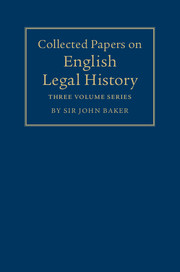Book contents
- Collected Papers on English Legal History: Volume I
- Contents
- List of Illustrations
- Acknowledments
- List of Abbreviations
- Introduction
- PART I The Legal Profession
- PART II The Inns of Court and Chancery
- 7 The Third University of England
- 8 The Inns of Court in 1388
- 9 The Division of the Temple: Inner, Middle and Outer
- 10 The Inn of the Outer Temple
- 11 The Old Constitution of Gray's Inn
- 12 The Ancient and Honourable Society of Gray's Inn
- 13 The Inns of Court and Chancery as Voluntary Associations
- 14 The Judges as Visitors to the Inns of Court
- PART III Legal Education
- PART IV Courts and Jurisdictions
- Collected Papers on English Legal History: Volume II
- Contents
- PART V Legal Literature
- PART VI Legal Antiquities
- PART VII Public Law and Individual Status
- PART VIII Criminal Justice
- Collected Papers on English Legal History: Volume III
- Contents
- PART IX Private Law
- PART X General
- Bibliography of the Published Works of Sir John Baker
- Index
14 - The Judges as Visitors to the Inns of Court
from PART II - The Inns of Court and Chancery
Published online by Cambridge University Press: 05 December 2014
- Collected Papers on English Legal History: Volume I
- Contents
- List of Illustrations
- Acknowledments
- List of Abbreviations
- Introduction
- PART I The Legal Profession
- PART II The Inns of Court and Chancery
- 7 The Third University of England
- 8 The Inns of Court in 1388
- 9 The Division of the Temple: Inner, Middle and Outer
- 10 The Inn of the Outer Temple
- 11 The Old Constitution of Gray's Inn
- 12 The Ancient and Honourable Society of Gray's Inn
- 13 The Inns of Court and Chancery as Voluntary Associations
- 14 The Judges as Visitors to the Inns of Court
- PART III Legal Education
- PART IV Courts and Jurisdictions
- Collected Papers on English Legal History: Volume II
- Contents
- PART V Legal Literature
- PART VI Legal Antiquities
- PART VII Public Law and Individual Status
- PART VIII Criminal Justice
- Collected Papers on English Legal History: Volume III
- Contents
- PART IX Private Law
- PART X General
- Bibliography of the Published Works of Sir John Baker
- Index
Summary
The two applicants in R. v. Visitors to the Inns of Court (1992) were barristers of Lincoln's Inn who had been disbarred for professional misconduct – arising in unrelated circumstances – as a result of findings by the Disciplinary Tribunal of the Inns of Court. Their respective appeals against disbarment were heard by three High Court judges sitting as visitors to Lincoln's Inn and the findings of misconduct were in each case upheld. In one case, the disbarment was confirmed; in the other, a suspension for five years was substituted. Both barristers then applied to the High Court for judicial review of the visitors' decisions, and their cases were heard together by consent. These were the first applications of their kind, it having only recently become accepted that visitors (in the usual sense of that term) are within the scope of judicial review.
As a preliminary issue, the Divisional Court was invited to determine whether the High Court had any jurisdiction to review the decisions of visitors to the inns of court. The determination depended on the categorisation of this particular form of visitatorial authority. If the three judges had been acting as visitors, in the same sense as visitors of universities and colleges, then their decision fell within the scope of judicial review as recently extended. If, on the other hand, they could be regarded as exercising their jurisdiction as judges of the High Court, it was conceded by counsel and accepted by the court that judicial review was unavailable; the court cannot review itself.
- Type
- Chapter
- Information
- Collected Papers on English Legal History , pp. 238 - 252Publisher: Cambridge University PressPrint publication year: 2013



